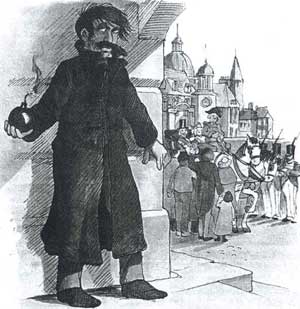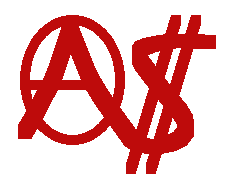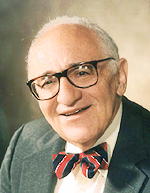I considered entitling this "Individualist Anarchism, Nowhere at Home" but I realized in time that alienation as a political theory has been done already by Karl Marx. If I had used that title, however, the point I would have been making is that the two movements which seem to be natural homes of individualist anarchism - libertarianism (for which it used to be a synonym) and the anarchist tradition (of which it is a subset) - are now uncomfortable places. This wasn't always true.
For example, although the Workingman's International (that touchstone of 19th century radical chic) is usually associated with Marxism, the First International consisted largely of Bakuninists (communist anarchists) and individualist anarchists. In other words, individualist anarchism as a radical political philosophy was taken seriously back then by other anarchists; it had credentials behind its name. This credibility came basically from two things. First, it came from the almost herculean efforts of libertarian figures such as Benjamin Tucker, who were not only active in labor organization but who were also responsible for the input of new, dynamic theory into anarchism, for example by translating the works of Max Stirner. In short, individualist anarchism had life and motion.
Secondly and, I think, more significantly, the credibility came from points of theory which individualist anarchism used to share with communist anarchism. Over the last century, however, the theory of individualist anarchism has changed dramatically and it has drifted far away from the other schools of anarchism: by which I mean communist anarchism, anarcho-syndicalism, and Christian anarchism.

Anarcho-syndicalism
The main school I will be contrasting with individualism is communist anarchism - the theory of which I'll go into shortly. But I want to take a minute to comment on the syndicalist and Christian anarchism since I won't be discussing them in any detail. Anarcho-syndicalism is theoretically close to communist anarchism even though, historically, there has been hostility between them. The hostility is largely the result of the anarcho-syndicalist belief that change should come through a reorganization of labor into a loose federation of collectively owned and operated factories whereas communist anarchists advocated other means. In other words, they both wanted an anarchistic worker's society, but they disagreed on how it was possible to get there. The most popular example of an American anarcho-syndicalist organization is the early I.W.W. [Industrial Workers of the World], also known as the Wobblies.

Christian anarchism, as a movement, is usually attributed to Leo Tolstoy and its name is fairly self-explanatory. Christian anarchism does not recognize the right to use violence for any purpose. It is a type of pacifism and its rejection of the use of force in self defense is the most significant difference it has with individualist anarchism. Generally speaking, however, Christian and individualist anarchism get along quite well and Tolstoy's work used to be advertised for sale in Benjamin Tucker's Liberty, the main forum of individualist anarchism in the late 19th Century.
As I mentioned before, in the days of Tucker individualist anarchism and libertarianism used to be synonymous. The schism occurred because the meaning of libertarianism has undergone separate changes which have taken it in a different direction so that the goals and strategy of libertarianism are often antagonistic to individualist anarchism.
These are the two points around which my speech revolves and to which I will return: changes within the theory of individualist anarchism that have alienated it from other forms of the philosophy; and, changes within libertarianism that have made it antagonistic to individualist anarchism.

Individualist anarchism
But, first, I want to give you some background on individualist anarchism so you have the inestimable benefit of knowing what I am talking about.
In 1833, the American libertarian Josiah Warren began publishing The Peaceful Revolutionist which was perhaps the first anarchist periodical and certainly the first individualist anarchist one. Warren didn't call himself an anarchist; in fact, no one used that word very much, except as a term of opprobrium to hurl at an opponent, until Pierre-Joseph Proudhon applied it to himself and made it "honorable." Nevertheless, it is clear that Warren was an anarchist. He called for a voluntary society organized around the individual as the basic unit. His approach was expressed in a report he wrote of the libertarian community, Utopia, in the May 1848 issue of The Peaceful Revolutionist. Warren wrote:
Throughout the whole of our operations . . . everything has been conducted so nearly upon the Individual basis that not one meeting for legislation has taken place. No Organization, no indefinite delegated power, no "Constitutions," no "laws" or "bye [sic] laws," "rules" or "regulations" but such as each individual makes for himself and his own business.
Now, the two key ideas in Warren's philosophy which became the two key concepts of individualist anarchism for over a century were the Sovereignty of the Individual, and Cost is the Limit of Price or the labor theory of value.
Sovereignty of the Individual is fairly self-descriptive and more commonly goes under the label of self-ownership which was the term used by the anti-slavery crusader and libertarian William Lloyd Garrison, a contemporary of Warren. Sovereignty of the Individual or self-ownership refers to the moral claim that every human being has to his or her own body. As Warren expressed it in his book, Practical Details:
Society must be so converted as to preserve the SOVEREIGNTY OF EVERY INDIVIDUAL inviolate. That it must avoid all combinations and connections of persons and interests, and all other arrangements which will not leave every individual at all times at liberty to dispose of his or her person, and time, and property in any manner in which his or her feelings or judgment may dictate, WITHOUT INVOLVING THE PERSONS OR INTERESTS OF OTHERS.
Now, self-ownership is still fairly common in libertarianism, although, as electoral politics prevails, the principle's popularity seems to be on the decline. Individualist anarchism opposes - as libertarianism used to - the very idea of anyone holding a position of unjust (that is, undelegated) power over someone else's life. It opposes anyone holding political office. There is a great tension between saying on one hand "your peaceful actions are sacrosanct and no one else's business", while on the other hand attempting to place someone in a position of unjust power over those activities. And the concept which is being stretched out of shape by this tension is self- ownership, Sovereignty of the Individual.
The second mainstay of 19th century individualist anarchism was Cost the Limit of Price, a version of the labor theory of value. This theory states that value results from labor and can come from nowhere else. If I work to produce something and sell it for $1.00, it is assumed that I have received the full, just value of my labor. However, if an entrepreneur who paid me $1.00 turns around and sells the product for $1.50, the question arises: where did the extra 50 cents, the extra value come from? Since all values under my theory comes from labor and since I provided all the labor that went into the product, the extra 50 cents of value obviously represents my labor which the entrepreneur (read capitalist) stole by giving me less than the full value of what my labor produced. In other words, profit is theft. Or as Sam Konkin put it so well in his last S.L.L. talk, the labor theory of value recognizes no distinction between profit and plunder. As another example, imagine that $1.00 is the just reward of my labor and I lend that dollar to you on the condition that I receive back $1.10 at the end of a year. Where did the 10 cents come from? Certainly not from my labor since I have already been paid in full. The 10 cents must result from your labor which I am stealing through interest. All profit was theft. Not metaphorically, but literally theft and the fact that people willingly paid interest and willingly sold their labor to capitalists did not mitigate the fact that a theft had occurred.
Now, the labor theory of value, which derives from Adam Smith, was an extraordinarily popular theory in 19th century radical movements, including libertarian ones. There were exceptions, for example the Classical Liberals in England and the Loco Focos in 18th Century America but, if you are dealing with American libertarianism in the 19th Century, you will find that the movement accepted the labor theory of value almost as completely as the modern movement accepts the free market.
This acceptance of Cost the Limit of Price was a strong tie between individualist anarchism and the other forms of anarchism. Communist anarchism and anarcho-syndicalism, especially, viewed capitalism as institutionalized force. From beginning to end, capitalism was profit which was theft committed against the workers; that's where you get the propaganda posters of capitalists as bloated parasites sucking the blood of the laborers. They sought to destroy such profit taking by force.
Individualist anarchists approached the situation differently. Although they agreed that profit was theft, their primary commitment was to a voluntary society and to the right of contract. In fact, Benjamin Tucker described the ideal society as "society by contract." In essence, they came to the conclusion that if you wanted to invite people to steal from you by contracting to pay interest or rent, it was your business. They might try to show you the error of your ways, but the bottom line was that everyone had the right to make a foolish, self-destructive contract and that no one had the right to interfere in that voluntary process. So, although there was theoretical agreement on the labor theory of value between individualist anarchists and their communist cousins, the added element of respect for contract within individualist anarchism led to radically different practical consequences. For example, whereas communist anarchists would put a gun to the head of landlords, individualists would leaflet all the tenants. And both would attack the State, because they believed that destroying the State would virtually eliminate such practices as charging interest. But, again, the individualists embraced non-violence as a political strategy.
So, what is the real difference here? Is it merely that individualist anarchists are nice people who won't use force to implement their theories whereas communist anarchists are evil? I think the real distinction is less ad hominem and more theoretically significant; and that is, they each define aggression in fundamentally different ways. To the individualist anarchist, aggression is defined with reference to property titles. For example, if a man snatches a dollar I earned from my hand, it is theft for two reasons: first, it is my dollar, I have title to it; and second, he has taken it without my consent. If, however, the man snatches a dollar I had previously stolen from him out of my hand, it is not theft for two reasons: it is not my dollar because he has title to it; it is his property and, therefore, my consent is unnecessary. So, the definition of aggression within individualist anarchism rests on two concepts: title and consent. Whose property is it and does the owner agree to what is going on?
Although the most important present disagreement between individualist and communist anarchism is the definition of property, I don't think this was the most significant point in the 19th Century. Since they both accepted the labor theory of value and condemned capitalism, the most important disagreement was in how they approached consent. With individualist anarchism consent was a fairly straightforward matter. You agreed or you didn't, you said "yes" or "no. " And, so long as you are saying "yes," it is in principle impossible to aggress against you. Not so with communist anarchism.
Communist anarchism contains the notion of economic coercion; that is, even if a worker consents to a certain wage, consents to have a portion of his labor stolen by the capitalist, the consent doesn't count because it was obtained through duress. The economic situation created by the capitalist is the equivalent of a gun pointed at the head of the worker: the capitalist says: work on my terms or starve. Allow me to steal from you or let your children go hungry. And the consent, the freedom venerated by the individualist anarchist is dismissed as a fraud. As the sort of freedom that says to the beggar and to the millionaire that they are both free to sleep under a bridge in the driving rain. In short, the communist anarchist does not recognize the possibility of such things as interest or rent existing under contract; by definition, they are acts of force and cannot be otherwise. Using force against those who charge interest or rent was, therefore, nothing more than self-defense.
This notion of economic coercion has dramatic implications for another key difference between these forms of anarchism: namely, how they define "justice" a not insignificant concept. Now, very briefly, an important difference is that communist anarchism approaches justice as an end state; by which I mean, it provides a specific picture of what constitutes a just society. It would be a society without a State or any capitalist practices in which the means of production are collectively owned and every worker receives the full reward of his labor. In other words, justice resides not only in the absence of institutionalized force (the State) but in the establishment of a specific economic arrangement.
In contrast, the individualist anarchist approach to justice is means oriented. It provides no end product, no particular social arrangement which constitutes justice, but says only "anything that's peaceful is just." Under individualist anarchism, you could have communist communities existing beside capitalist ones and, so long as membership was voluntary, the arrangement in each would be just. So, again, to the communist anarchist justice is an end state (a specific economic system); to the individualist anarchist, it is means oriented (anything that's peaceful) with no hard vision of what would result.
They differ as well on the concept of class. Since communist anarchism fundamentally opposes capitalism, often considered to be inextricably a part of the State, it defines class in economic terms, in relation to ownership of the means of production. You are a capitalist or you are a worker. If you are a capitalist, you live off the sweat and blood of the worker regardless of whether or not you know it or whether you are simply the thoughtless, apolitical wife of a banker. You are part of the capitalist class. Since individualist anarchism fundamentally opposes only one thing - aggression and the State as institutionalized aggression - it defines class in political rather than economic terms. It defines class in terms of one's relationship to the State. You are a member of the economic class which lives through voluntary exchange or you are a member of the political class which lives off theft and tribute from the economic class. This is the basis of the classic libertarian distinction made by Franz Oppenheimer between the political and the economic means.
So, returning to the use of violence. These conflicting concepts of justice and class are key and contributed heavily to the different historical paths taken by communist and individualist anarchism. Ponder for a moment, who is more likely to use violence a man who is committed to peaceful means whatever those means may bring, or a man who is committed to a specific form of society with no moral commitment to any specific strategy, short of not using the State? As you might suspect, communist anarchists have been far more willing to use violence to implement their form of justice than have individualist anarchists. For one thing, the communist anarchist ideal can be implemented through violence. You can enforce a specific economic arrangement on people. But you cannot use force to create and maintain a society without force.

Anarchism, in general, has received bad PR with regard to violence and the bomb-throwing demented anarchist is as much a cultural caricature as the dumb blonde. Unfortunately, as with most caricatures, there is some grain of truth in the picture. And, unfortunately, critics have made no attempt to distinguish the truth, to distinguish one form of anarchism from another to ascertain who is the guilty party. Overwhelmingly, the violence attributed to anarchists came either from communist anarchism or from the State's attempt to discredit the anarchist tradition. It is ironic that one of the charges that used to be brought against individualist anarchism in the 19th Century was that it was too peaceful; an anarchist community would have no defense against those willing to use violence to conquer it. Needless to say, this view of anarchism changed drastically and it is possible to point to several events which were pivotal in changing this attitude.
One of these events was the Russian Revolution, or rather the period preceding the Revolution during which several communist anarchist groups openly and repeatedly committed violence as a strategy against capitalists and the State. Part of this strategy included throwing bombs into crowded restaurants on the assumption that only capitalists could afford to eat in that restaurant and all members of the capitalist class were deadly enemies. Although Russian anarchists did not originate the idea of "propaganda by deed," they became famous for using that method. And even though Russia was also the home of Christian anarchism and although the violence committed by communist anarchists was minuscule compared to the violence committed by the State or by the non-anarchist revolutionaries who followed, the Russian Revolution helped to cement the association between anarchism and violence.
In America, the Haymarket incident and the assassination of President McKinley had a similar effect. The Haymarket incident occurred in 1886, in Chicago which was a stronghold of communist anarchism. A group of anarchists, most prominently Albert Parsons, held an open door labor meeting; as it began to break up police converged on the peaceful crowd. A bomb was thrown at the police who opened fire on the crowd. Seven demonstrably innocent men were arrested and tried: one committed suicide, four were hanged, two were subsequently pardoned. I don't have time to go into the Haymarket incident other than to point out three things: first, the men involved in the Haymarket affair were communist anarchists who openly advocated violence, which is not to say they were guilty of any crime or to reduce their status as anarchist martyrs. Second, the Haymarket incident and the public furor that followed it changed the public perception of anarchism by associating it firmly with violence.
Third, individualist anarchists did not enthusiastically support the Haymarket martyrs. For example, although Benjamin Tucker condemned the State and recognized it as the true villain of the event, he criticized the Haymarket Seven for consciously promoting violence and he was reluctant to raise them to the status of anarchist heroes. In the July 31, 1886 issue of Liberty, he wrote: "It is because peaceful agitation and passive resistance are weapons more deadly to tyranny than any others that I uphold them ... brute force strengthens tyranny... War and authority are companions; peace and liberty are companions... The Chicago Communists I look upon as brave and earnest men and women. That does not prevent them from being equally mistaken." This reluctance on the part of individualist anarchists, whose stronghold was Boston, outraged other anarchists who began to refer to anyone who criticized the Haymarket martyrs as 'a Boston anarchist' regardless of where the critic lived. (Tucker's Liberty was published from Boston.)
The assassination of President McKinley in 1901 by a self- professed anarchist who claimed to have been inspired by hearing Emma Goldman speak almost destroyed the anarchist movement. The deportations and hideous laws that followed were the most obvious repercussions. But perhaps as importantly, it absolutely cemented the association between violence and anarchism, all forms of anarchism. The movement declined sharply past the turn of the century. And individualist anarchism virtually died in 1908 when the offices of Tucker's Liberty and bookstore burnt to the ground.

Anarcho-capitalism
So, if those were the days when communist and individualist anarchism had a lot in common, what constitutes a real difference of opinion? A real difference is contained in the changes individualist anarchism went through in the 1950s. What happened? In my opinion, the most significant changes can be analyzed by referring to one man, Murray Rothbard. Rothbard and the circle of scholars who met in his parlor in the 1950s - e.g. Leonard Liggio, Ralph Raico, and Ron Hamowy - did something astounding. Rothbard took three traditions, three themes which were considered antagonistic to each other and wove them together to produce the philosophy that dominates modern individualist anarchism. [Anarcho-capitalism.]
- The first tradition was Austrian economics. As a specialist in economic theory, Rothbard became an admirer of Ludwig Von Mises and adopted Austrian economics, a radical and sophisticated defense of the laissez-faire capitalism.
-
The second tradition was individualist anarchism. Now remember, Tucker attacked capitalism as theft and he was considered a moderate on the question, as anarchists go. The genius of Rothbard lay in taking the value of individualist anarchism namely, the theoretical roots of "self-ownership" and its radical civil liberties, while discarding its excess baggage namely, the labor theory of value. He replaced this economic theory with a defense of the free market. The result was something entirely new under the sun: an anarchist movement that championed capitalism. It is difficult to even come up with a parallel to give you a sense of how incredible a hybrid capitalism and anarchism make. If you can imagine someone proving that not only are Freudianism and Behaviorism both correct but that both are nd always have been compatible, you might get the flavor of it all.
For better or worse, this moral and sophisticated defense of capitalism has greatly distanced individualist anarchism from the general anarchist movement which still considers capitalism to be an evil on the level of, if identical with, the State. And when you talk to communist anarchists, if they don't get immediately hostile, they are likely to express total bewilderment at this bizarre combination of beliefs.
- The third tradition Rothbard and his circle incorporated into this system was isolationism, Old Right foreign policy. And by incorporating it into a system of economics and civil liberties, he created the synthesis that dominates the theory of individualist anarchism as it exists today.

Murray N. Rothbard
Founder of anarcho-capitalism
and modern libertarianism.
Rothbard is also often credited with modern libertarianism, which I consider to be a movement separate from individualist anarchism: that is, I believe they have distinct and often antagonistic goals and strategies. When Tucker referred to himself as a libertarian, it meant individualist anarchist, but words have lives of their own and meanings change. As Murray once said to me when I commented on his many strategic alliances: "It's a fast moving world, sweetie." The word liberal once referred to an individualist who defended the free market; now, it means almost the opposite and libertarians need to use the term "classical liberal" if they want to be clear. Similarly, the word "libertarian" has changed due to the fairly successful efforts of the Libertarian Party to associate libertarianism with political goals and the political means, both of which are anathema to individualist anarchist theory.
The integrating theme behind individualist anarchism was the primacy of the individual and the commitment to rid society of all but defensive force. And the kind of force they most loudly opposed was political activity, i.e., voting and electoral politics. They considered any participation in electoral politics to be a violation of libertarian principles. In Tucker's words: "If Liberty has a weak-kneed friend who is contemplating a violation of his anarchist principles by voting just for once, may these golden words from John Morley's 'Compromise' recall him to his better self: 'A principle, if it be sound, represents one of the larger expediencies. To abandon that for the sake of some seeming expediency of the hour is to sacrifice the greater good for the less on no more creditable ground than that the less is nearer.'"
On the issue of holding political office, Lysander Spooner was one of the clearest of the individualist anarchists. In A Letter to Thomas Bayard, he framed his objection to the holding of political office, irrespective of who the particular holder may be. By what right, Spooner asked, can one person occupy a position of power over another's life? What circumstance would make this a proper situation? If you have the natural right to protect your life and property and if you delegate this right to another person, then his position is contractual and thereby in accord with libertarian principles.
But what does this delegation entail? It means, according to Spooner, that you possess the right which is being delegated; that the delegation was explicit and not merely assumed, for a contract may not be assumed; and, that you can withdraw your delegation and reclaim the exercise of your natural rights, for to say that you cannot withdraw your delegation is to say that you have given away not the exercise of a particular right but your entire liberty. In Spooner's words: "No man can delegate, or give away his own natural right to liberty. . . or to give to another, any right of arbitrary dominion over himself; for that would be giving himself away as a slave. And this no one can do. Any contract to do so is necessarily an absurd one and has no validity. "
Voltairine de Cleyre expressed a similar view in a lecture delivered before the Boston Secular Society in 1890 and subsequently reprinted in Liberty.
I go to the White House. I say 'President] Harrison, are you the government?' 'No, madam, I am its representative.' 'Well, then, where is the principal? Who is the government?' 'The people of the United States.' 'The whole people?' 'The whole people.' 'You, then, are the representative of the people of the United States. May I see your certificate of authorization?'
De Cleyre went on to define what she meant by authorization and why she morally opposed political office and the process of voting. "A body of voters cannot give into your charge any rights but their own. By no possible jugglery of logic can they delegate the exercise of any function which they themselves do not control. If any individual on earth has a right to delegate his powers to whomsoever he chooses, then every other individual has an equal right; and if each has an equal right, then none can choose an agent for another, without the other's consent. Therefore, if the power of government resides in the whole people and out of that whole all but one elected you as their agent, you would still have no authority whatever to act for that one. "
To drive my point into the ground...The individualist anarchists overwhelmingly believed that voting and the holding of political office were direct violations of libertarian morality. This issue was debated only twice in Liberty. The first instance occurred when Henry Appleton attempted to infiltrate and use the Knights of Labor to achieve certain labor goals through that organization's participation in politics. Appleton accepted political activity as compromise. He wrote: "Tucker has yet to learn that compromise is a true scientific principle under Anarchism. " He then proceeded to defend compromise against the rigid "plumb-line" approach of Tucker. Tucker's harsh reply was entitled "Plumb-line or Corkscrew?" Although Appleton's integrity was never questioned, the ensuing dispute was so bitter that Appleton, hitherto Liberty's most frequent contributor, chose to disappear from its pages.
Victor Yarros also locked horns with Tucker. In one of his many articles for Liberty, Yarros opposed voting on strategic rather than on moral grounds. He wrote: "A friend and reader of Liberty recently put this query to me: When some practical, immediate good can be accomplished by the election of a particular man or the victory of a particular party, is it not the part of wisdom and propriety . . . to aid and abet such election?"
Yarros replied: "The real question is whether the immediate and practical good which, by our hypothesis, can be secured is not overbalanced by indirect and remote injury to the essential aims and purpose of Anarchism. Answer this question in the negative, and all reasons for boycotting politics vanish .... Anarchists have no religious or moral objection to voting and party warfare." Tucker responded: "For my part, when I say that I would use the ballot if I thought thereby I could best help the cause of freedom, I make the declaration in precisely the same sense . . . as when I declare . . . that I would dynamite if I thought that thereby I could best help the cause of freedom."
Although he didn't disappear from Liberty as Appleton did, Yarros backed down from the issue. The point here is that 19th century Individualist anarchism/libertarianism was overwhelmingly anti-political. One of Liberty's themes was "power corrupts" and one of its regular columns, "The Beauty of Government," was devoted to this theme. If libertarianism of the late nineteenth century stood for any one social principle it was opposition to the political solution (a form of force) to social problems.
Unfortunately, perhaps because it was such a basic aspect of individualist anarchism, the anti-political position was often been assumed as self-evident rather than worked out in hard detail. And if individualist anarchism has contributed to its own decline, it has been in this respect. Individualist anarchists have naively assumed that, because libertarians flatly condemned the political means, the State and politicians, this condemnation meant that libertarians had some fundamental objection to electoral politics itself. A mistaken assumption. More and more, libertarianism has become identified with the Libertarian' Party. More and more, the goal of libertarianism has changed from dismantling the State to joining the State and replacing the face behind the desk of power as though it were the particular face and not the desk - the position of unjust power itself - that was the enemy. But to an individualist anarchist, the enemy is anyone who assumes political power and anyone who aspires to it. And the onus of proof is not on the anarchist to explain why he objects to someone fighting for vast power over his life, it is on the politician and the libertarian who supports him to explain how such power is justified.
Nevertheless, whoever logically carries the burden of proof, it has become necessary for individualist anarchism to develop a comprehensive defense of anti-political theory in order to counter the grotesque spectacle of anarchists running for President. Fortunately, there is wonderful work being done to fill in the gaps of anarchist theory in which political weeds have grown. The Voluntaryist has been running a series of articles entitled The Ethics of Voting by George H. Smith in which Smith breaks new ground by delineating an institutional analysis of the State. Because anarchism is more than just a commitment to non-aggression; it is the principled rejection of the State.
It is commonly assumed that individualist anarchism and libertarianism are two points along the same road, chat we are fellow travelers and, frankly, I feel tremendous goodwill toward many of the people within the LP. But this goodwill does not affect the fact that they and I are on fundamentally different and antagonistic paths. And anarchists who are working within the Party in order to smash the State are fooling themselves. They are donating their time, money, and sanction to the political process with the stated goal of creating yet another politician. Only this time it is a "good" politician--their politician. And where have we heard this before?
As libertarianism becomes increasingly political, it will become increasingly hostile to individualist anarchism, because anarchism poses as great a threat to the political ambitions of the LP as it does to the conventional defenders of government. I have no intention of amending the slogan “Smash the State” to read “Smash the State Except for the LP.” And if the LP is ever successful they will quickly turn on the anarchists, turn on their supposed fellow travelers. The anarchists will then learn from political libertarians the same lesson that the Russian anarchists learned from the Bolsheviks - we are fellow travelers no more.
